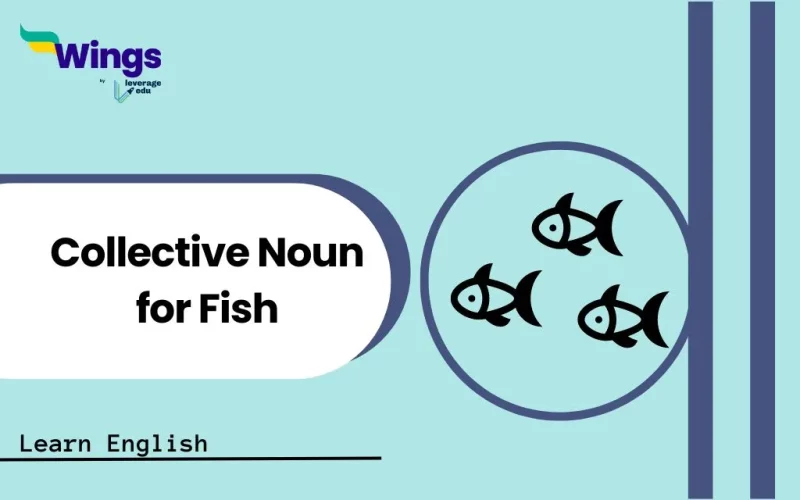Collective noun for fish is a word that describes a group of fish swimming together. The most common collective noun for fish is “school,” but there are other terms like “shoal” and “pod” that can also be used. Understanding collective nouns helps us communicate more clearly about groups of animals. In this blog, we will explore the meaning of these terms, provide exercises to test your knowledge and share synonyms for collective nouns related to fish. This guide will help you learn more about collective nouns for fish and how to use them effectively.
This Blog Includes:
Also Read: Best Idioms with Examples and Meanings
What is the Collective Noun for Fish? Meaning
The collective noun for fish is primarily “school,” which refers to a group of fish swimming together in a coordinated manner. Understanding these collective nouns helps us appreciate the communal nature of fish and their interactions in aquatic environments. Altogether, these terms highlight the importance of social structures in the animal kingdom.
Also Read: What are Nouns?
Origin of the Term ‘Shoal’
The term “school” and “shoal,” have their origins in the Dutch word “schole,” which means a troop or crowd. This term has evolved to describe groups of fish that swim together, often for protection against predators.
Synonyms of Collective Noun for Fish
Collective nouns for fish are words that describe a group of fish. These terms often evoke a sense of movement, abundance, or a specific behavior. Some common examples include:
- Shoal: A large group of fish swimming together in a dense formation.
- School: A group of fish swimming together in a coordinated manner, often changing direction as a unit.
- Swarm: A large number of fish moving together in an erratic or unpredictable way.
- Pod: A small group of fish, often of the same species, swimming together.
- Run: A large group of fish migrating together, often upstream to spawn.
These terms can add depth and colour to descriptions of marine life, painting vivid pictures of underwater ecosystems and the behaviours of these fascinating creatures.

Noun Quiz
Instruction: Choose the appropriate answer from the given options:
1. What is the collective noun for a group of fish?
a) School
b) Flock
c) Swarm
d) Pack
Answer: a) School
2. Which of the following is another term for a group of fish?
a) Pod
b) Army
c) Colony
d) Band
Answer: a) Pod
3. Fill in the blank: A ______ of fish is swimming in the ocean.
a) School
b) Pack
c) Swarm
d) Flock
Answer: a) School
4. What is a group of fish commonly referred to as?
a) A band
b) A shoal
c) A team
d) A crowd
Answer: b) A shoal
5. Which of the following is NOT a collective noun for fish?
a) School
b) Shoal
c) Flock
d) School
Answer: c) Flock
6. Choose the correct collective noun: A ______ of fish.
a) School
b) Pack
c) Gaggle
d) Colony
Answer: a) School
7. What is the term for a large group of fish?
a) School
b) Flock
c) Pod
d) Swarm
Answer: a) School
8. Fill in the blank: A ______ of fish can often be seen near coral reefs.
a) School
b) Swarm
c) Team
d) Pack
Answer: a) School
9. Which of the following is a valid collective noun for fish?
a) School
b) Swarm
c) Pack
d) All of the above
Answer: d) All of the above (though “swarm” is more commonly used for insects)
10. Identify the collective noun: A ______ of fish is swimming together.
a) School
b) Flock
c) Group
d) Pack
Answer: a) School
Related Reads
| Collective Noun for Class 3 | Noun Starting with N |
| Noun for Class 5 | Common Noun |
| Noun that Starts with I | What is the Noun of Rely |
| Noun Starting with S | Noun of Free |
FAQs
The collective noun for fish is either ‘shoal’ or ‘school.’ These words describe a group of fish swimming together.
The correct term for a group of fish is “school.” However, it can also be referred to as a “shoal.” Both words are commonly used to describe a collection of fish swimming together.
The most frequently used terms are “school” and “shoal.” These words both come from the Dutch word “schole,” which means a group or crowd.
This was all about the ‘Collective Noun for Fish’ for you. We hope it was useful to you. You can also follow the Learn English page of Leverage Edu for more exciting and informative blogs related to grammar and language.
 One app for all your study abroad needs
One app for all your study abroad needs














 45,000+ students realised their study abroad dream with us. Take the first step today.
45,000+ students realised their study abroad dream with us. Take the first step today.

